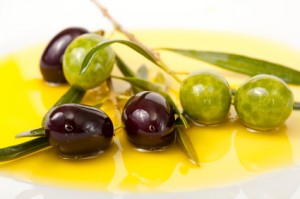More Health Cred for the Med Diet. Now researchers say eating a Greek-style Mediterranean diet may be the latest weapon in the fight against skin cancer
According to researcher Dr Niva Shapira, who is presenting at the International Congress of Dietetics in Sydney this week (September 5-8th), eating a Mediterranean diet rich in antioxidants and omega-3 fats, may be useful along with current sun smart advice.
In Britain, around 11,100 cases of skin cancer are linked to our over exposure to the sun (regular sun bed use and repeatedly binge burning on holidays are among the worst habits for increasing risk) each year. Although melanoma survival rates have in fact been improving for the last 25 years in the UK thanks to new treatments and early detection (84 per cent of men and 92 per cent of women survive at least five years after diagnosis) around 2,750 Brits still died from skin cancer in 2010 in the UK, that’s around seven every day.
Despite their typically outdoor lifestyles, people living in sunny Greece have among the lowest rates of melanoma, compared with the rest of Europe and other sunny countries like Australia. Greece has around 2-3 cases of skin cancer per 100,000 people, the European average is around 6-8 cases per 100,000 and Australian rates are around 30-40 cases per 100,000 people.
‘It’s more than their olive skin. We think the difference in skin cancer rates between Greeks in Greece and others may be partially due to the different eating habits in these countries,’ said Dr Shapira.
‘A traditional Greek-style Mediterranean diet contains sun-protective components, such as antioxidants, in foods like fruit, vegetables, legumes, herbs, tea and omega-3 fats from fish and omega-9 from olives and olive oil,’ said Dr Shapira.
She studied two groups of women who were exposed to the sun for 4-6 hours a day over two weeks. One group was given a fruit drink enriched with antioxidants, while the other drank water or soft drinks.
In the control group (those drinking water or soft drinks), blood levels of malondialdehyde, a marker for oxidative stress in the body which is linked to cancer risk, increased by around 55 per cent. But in the women who had the fruit drink fortified with antioxidants, malondialdehyde levels dropped by 16 per cent.
In further studies, Dr Shapira has indicated that tomato paste, a staple Greek ingredient containing antioxidants such as lycopene, reduces and delays UV-induced skin redness.
‘These antioxidants accumulate in the skin where they serve as a first line of protection against UV radiation and cell damage – and essentially protect the whole body against photo-oxidative stress from the sun,’ said Dr Shapira.
According to Dr Shapira, dietary supplements don’t have the same effect as foods, which provide a synergistic mixture of protective nutrients.
Spokesperson for the Dietitians Association of Australia, Dr Catherine Itsiopoulos, said the research is promising.
‘A traditional Mediterranean-style diet has already been shown to improve heart health and increase longevity. So this research provides another reason to consider going Greek with what you put on your plate,’ said Dr Itsiopoulos, an Accredited Practising Dietitian.
She said this could be critical for children, when the potential for inducing melanoma is highest, as the burns children get accumulate to increase risk in adulthood.
Like this article? Sign up to our newsletter to get more articles like this delivered straight to your inbox.





















































